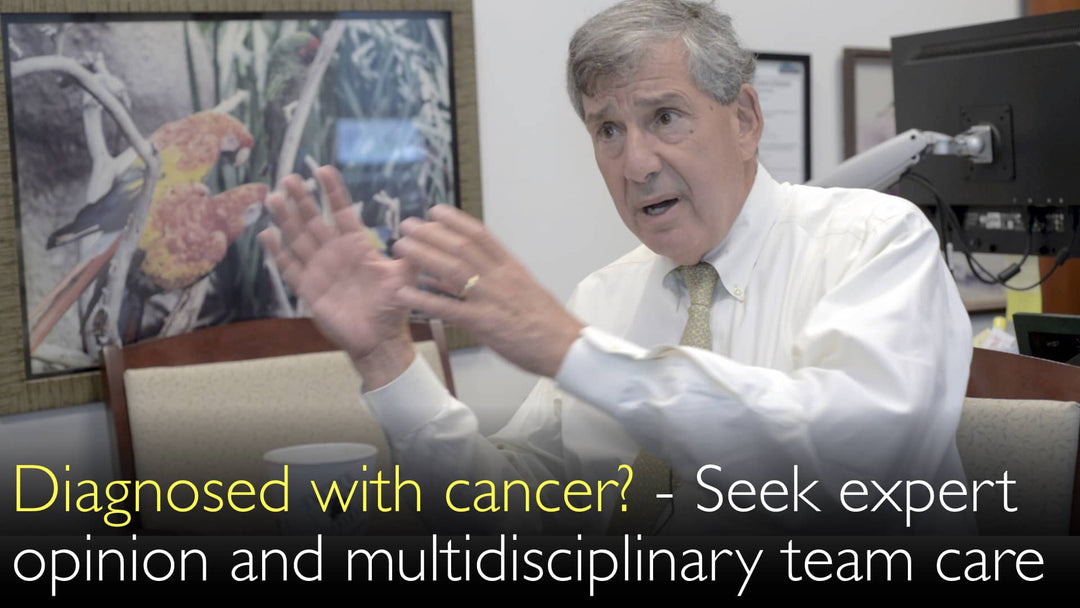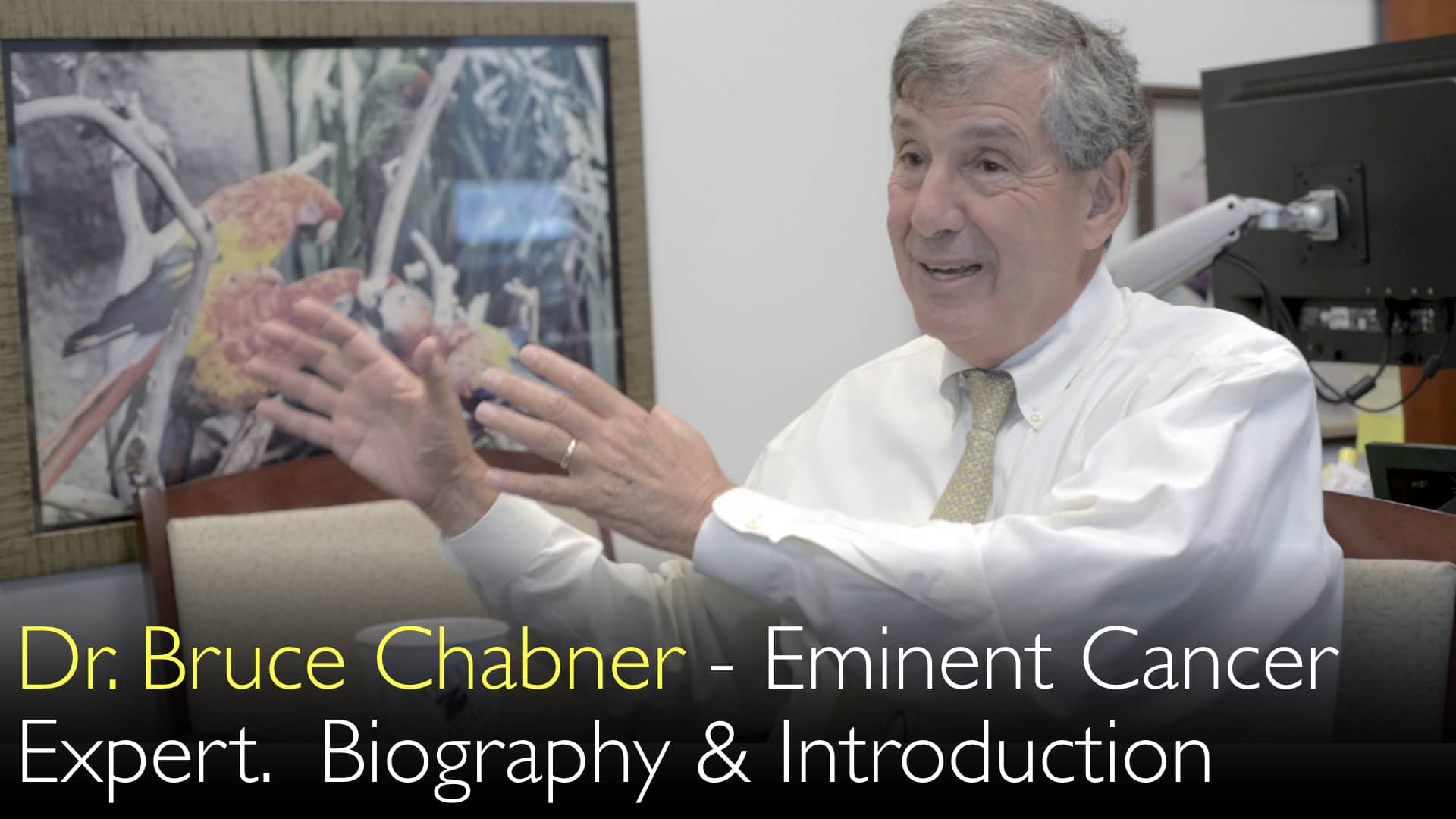מומחה מוביל באונקולוגיה, ד"ר ברוס צ'אבנר, MD, מסביר כיצד גישה רב-מקצועית של צוות וחיפוש חוות דעת מומחה שנייה הם קריטיים לטיפול אופטימלי בסרטן, במיוחד עבור אבחנות מורכבות, ודן באתגרים של גישה לטיפול מומחה באזורים מרוחקים לעומת מרכזי סרטן גדולים.
מדוע צוות רב-מקצועי וחוות דעת נוספת חיוניים בטיפול בסרטן
קפיצה לפרק
- חשיבות חוות דעת נוספת
- גישה למומחיות אונקולוגית
- גישת הצוות הרב-מקצועי
- התגברות על הטיית טיפול
- מתי לפנות לחוות דעת שלישית
- תפקיד המרכזים האונקולוגיים הגדולים
- תמליל מלא
חשיבות חוות דעת נוספת
קבלת חוות דעת רפואית נוספת חיונית ביותר לאחר אבחנה חדשה של סרטן או כאשר קיים חשד למחלה. ד"ר ברוס צ'אבנר, MD, מאשר כי בדיקה מומחית של הבעיה הרפואית הספציפית של המטופל היא קריטית, מכיוון שהחלטות הטיפול הראשוניות הן לרוב תלויות זמן ועשויות לקבוע את מהלך חיי המטופל. חוויה אישית ששיתף המראיין ד"ר אנטון טיטוב, MD, ממחישה זאת היטב: שני מנתחים חזה בעלי ניסיון רב הציעו הערכות שונות לחלוטין לגבי הגידול הריאתי של אמו, החל מאי-טיפול ועד לניתוח שעשוי להיות מרפא.
גישה למומחיות אונקולוגית
מכשול משמעותי בטיפול אונקולוגי מיטבי הוא החלוקה הלא-שוויונית של מומחיות אונקולוגית מיוחדת בעולם. ד"ר ברוס צ'אבנר, MD, מציין שבעוד שמרכזים אקדמיים גדולים כמו בוסטון מספקים גישה לתת-מומחים לסוגי סרטן ספציפיים כמו סרטן ריאות לא-קטנני או גידולים נוירואנדוקריניים, מטופלים בבתי חולים כפריים או באזורים מרוחקים לרוב חסרים גישה זו לחלוטין. פער זה בולט עוד יותר במדינות מתפתחות, ויוצר אתגר גלובלי בהבטחת שכל מטופל יקבל טיפול מהמומחים המתאימים ביותר לאבחנה הספציפית שלו.
גישת הצוות הרב-מקצועי
תקן הזהב לטיפול אונקולוגי מודרני הוא גישת הצוות הרב-מקצועי (Multidisciplinary Team, MDT). ד"ר ברוס צ'אבנר, MD, מדגיש שבמרכזים אונקולוגיים מובילים, המטופל נבדק לא על ידי רופא בודד אלא על ידי צוות מומחים. צוות זה כולל בדרך כלל אונקולוג רפואי, מנתח, אונקולוג רדיותרפי, רדיולוג ופתולוג. מומחים אלה משתפים פעולה כדי לבחון את כל היבטי המקרה ולפתח תוכנית טיפול מוסכמת ואחידה התואמת את האינטרסים של המטופל הספציפי, במקום להציג פרספקטיבה המוגבלת להתמחות אחת.
התגברות על הטיית טיפול
יתרון מרכזי של הצוות הרב-מקצועי הוא שהוא ממתן את ההטיה המובנית שעלולה להתרחש כאשר מטופל פונה תחילה רק לסוג אחד של מומחה. ד"ר אנטון טיטוב, MD, ממחיש זאת עם הדוגמה של סרטן הערמונית, שבה המומחה הראשון שנועץ יכול להשפיע heavily על מסלול הטיפול - בין אם ניתוח, רדיותרפיה או מעקב פעיל. מרפאה רב-מקצועית מבטיחה שכל המומחים האונקולוגיים הרלוונטיים יעריכו את המקרה יחד מההתחלה, מונעת תפיסה ממודרת ומובילה להמלצת טיפול מאוזנת ומבוססת-ראיות.
מתי לפנות לחוות דעת שלישית
במקרים שבהם שתי חוות הדעת הרפואיות המומחיות הראשונות סותרות זו את זו, פנייה לחוות דעת שלישית עשויה להיות צעד necessary. ד"ר ברוס צ'אבנר, MD, מכיר במציאות זו אך מזהיר כי זמן הוא גורם קריטי באבחנות סרטן רבות. הדחיפות להתחיל טיפול effective במהירות חייבת להיות מאוזנת עם הצורך בודאות אבחנתית. כדי לחסוך זמן יקר, הוא מציע לבקש חוות דעת במקביל או להשתמש בצוות רב-מקצועי מההתחלה, שנועד לספק הערכה מקיפה ולמנוע עצות סותרות ממומחים בודדים.
תפקיד המרכזים האונקולוגיים הגדולים
מרכזים אונקולוגיים גדולים מספקים ריכוז של מומחיות תת-התמחותית שלרוב אינה זמינה elsewhere. כפי שהוסבר על ידי ד"ר ברוס צ'אבנר, MD, מוסדות אלה מציעים ידע מעמיק לא רק בקטגוריות רחבות כמו סרטן ריאות אלא בתת-הסוגים המולקולריים והיסטולוגיים הספציפיים של המחלה. עבור מטופל או משפחה, הגישה למרכזים אלה עשויה לדרוש מחקר מקיף, networking מקצועי ונסיעות, מה שיכול להוות נטל כספי ולוגיסטי משמעותי, אך ההשפעה הפוטנציאלית על איכות הטיפול והתוצאה יכולה להיות profound.
תמליל מלא
ד"ר אנטון טיטוב, MD: אבחנת הסרטן הופכת מדויקת יותר ויותר. הטיפול בסרטן הופך מתוחכם יותר. אמי אובחנה עם גידול ריאתי. חוויתי חוויה אישית עמוקה.
שני מנתחי חזה בעלי ידע וניסיון רב נתנו הערכות שונות לחלוטין של מצבה. אחד אמר, "אין מה לעשות. היא מטופלת קשישה." מנתח אחר אמר, "נוכל לבצע ניתוח מרפא now."
הצלחנו לזהות מה יהיה הטיפול הטוב ביותר במצבה הספציפי. עשינו זאת על ידי חיפוש בספרות הרפואית. מצאנו את הטיפול הטוב ביותר על ידי בקשת חוות דעת ברשת המקצועית שלנו.
מטופלי סרטן רבים אינם מטופלים על ידי המומחים המתאימים ביותר לאבחנה הספציפית שלהם!
ד"ר ברוס צ'אבנר, MD: כן, כמובן שזה נכון בסרטן. אבל זה נכון לא רק בסרטן.
ד"ר אנטון טיטוב, MD: עד כמה חשוב לבקש סקירה של המצב על ידי מומחה בעל ידע בבעיה הרפואית המדויקת שיש למטופל? עד כמה חשוב לקבל חוות דעת רפואית נוספת, במיוחד כאשר נעשית אבחנה חדשה של סרטן או כאשר קיים חשד?
ד"ר ברוס צ'אבנר, MD: זה חשוב. לרוע המזל, חוות דעת מומחית רפואית אינה זמינה תמיד. בארצות הברית, אנחנו מוציאים כל כך much money על שירותי בריאות, אך עדיין יש לנו מטופלים בבתי חולים כפריים באזורים הכפריים. אין להם גישה easy לחוות דעת מומחית.
מטופלי סרטן often אינם בעלי גישה למרכז סרטן. אז זה ideal. אם אתה גר בבוסטון, יש לך three or four hospitals עם פקולטות very large שמתמחות בתת-התמחויות.
זה לא רק סרטן ריאות, אלא בתת-הקבוצות הקטנות של סרטן ריאות. זה סרטן ריאות לא-קטנני, סרטן ריאות קטנני, קרצינומות קשקשיות, גידולים נוירואנדוקריניים. זו המומחיות הזמינה במקום like this hospital, או בבתי החולים השותפים שלנו, Brigham and Women’s Hospital ו-Dana-Farber Cancer Institute.
אנחנו unusual ושונים ממה שהיית מוצא בסביבה כפרית. אז לרוע המזל, not everybody יש גישה למומחיות הטיפול האונקולוגית הזו. זו בעיה.
ואז אפילו beyond טיפול בסרטן בארצות הברית, אני עובד במאמציoutreach באפריקה. הם would be thrilled לקבל אפילו what's available לנו כאן באבחנה וטיפול בסרטן, what we already have בבתי החולים המרוחקים יותר שלנו באזורים הכפריים. זו בעיה.
החלוקה של מומחיות הטיפול בסרטן אינה even worldwide. מומחיות הטיפול בסרטן certainly might not even be even within הקהילות האקדמיות המובילות בבוסטון.
ד"ר אנטון טיטוב, MD: מכיוון שהרפואה כל כך siloed, המצב של אמי actually developed בבוסטון. זה took חיפוש ספרותי כדי למצוא מי הוא המטופל. היינו must למצוא מי really dedicated את חייו המקצועיים לסוג הספציפי הזה של גידול ריאתי. כך השגנו את תוצאות הטיפול tumor טובות יותר.
ד"ר ברוס צ'אבנר, MD: זה נכון! עשית עבודה very good, obviously. אתה in a sense lucky שחיית בקהילה זו. Sometimes you've been living באזור much more remote שבו לא הייתה מומחיות. How would you know? היית must לנסוע 500 or 1000 miles כדי לגלות על הטיפול cancer הטוב ביותר.
זה not easy. מטופלים many can't afford that. אז זו בעיה real, השונות במומחיות הטיפול cancer הזמינה למטופלים.
אני מניח, in general, הדבר האחר הוא זה: עבור סוג סרטן very serious, אתה must לקבל חוות דעת רפואית מומחית. בסרטן, חיי המטופל at stake. Often ההחלטות הראשוניות must להתקבל fast לגבי what to do, how לטפל במטופל cancer.
זה always reasonable לבקש חוות דעת רפואית נוספת.
ד"ר אנטון טיטוב, MD: Sometimes אתה need חוות דעת רפואית מומחית שלישית!
ד"ר ברוס צ'אבנר, MD: Well, yeah! Sometimes אתה מוצא חוות דעת רפואית מומחית conflicting משתי החוות דעת הראשונות. Then אתה may want לפנות לחוות דעת שלישית. Of course, אתה don't want לבזבז too much time, because באבחנות סרטן some time הוא extremely important.
קבלת treatment cancer fast וטיפול בו היא crucial. זו הסיבה שגישת multidisciplinary works best. אתה must לבצע חוות דעת רפואית מומחית in parallel. אתה must להשתמש ב-panel של מומחים. כל medical expert might להעריך את המצב cancer independently. זה could be אופציה אחת.
אתה bring out היבט important נוסף של פנייה למרכז סרטן. When אנחנו רואים מטופל here עם סרטן הערמונית או סרטן הלבלב, זה not just רופא one שרואה את המטופל. זה צוות multidisciplinary: אונקולוג רפואי, מנתח, אונקולוג רדיותרפי, רדיולוג, הפתולוגים.
Radiologist לוקח את צילומי ה-X-rays ומפרש אותם. כל ה-oncologists and experts must לעבוד together כדי להגיע לתוכנית therapy cancer reasonable, what is best עבור המטופל particular עם cancer.
ד"ר אנטון טיטוב, MD: Because בסרטן הערמונית, הגורם שקובע את סוג treatment cancer הערמונית הוא סוג המומחה שהמטופל רואה first. סרטן הערמונית מטופל בניתוח או רדיותרפיה או watchful waiting even.
יש expert שדנתי איתו בלונדון. That's correct! If אתה first רואה את המנתח, אתה may להיות מומלץ לעבור ניתוח לסרטן הערמונית. It is best שאתה רואה את group של medical experts together. זה צוות multidisciplinary.
זה what we do here. הם called multidisciplinary clinics. יש להם at least expert one מכל אחד מתחומי האונקולוגיה הרלוונטיים. אתה may לקבל חוות דעת consensus על how לטפל ב-cancer.
זה very different מהדעה שהמנתח would offer, או אונקולוג רפואי או radiation therapist if הם רואים את המטופל by themselves only. זו הערך של multidisciplinary assessment של כל מטופל cancer.
ד"ר ברוס צ'אבנר, MD: Yes.





